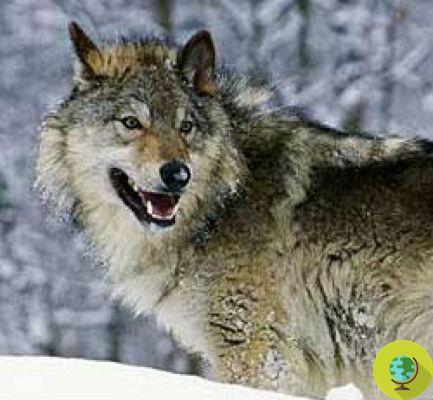
This ridiculous strategy to protect the ecosystem of one's rich, wonderful and immense territory, finding in the poor wolf a real scapegoat, which they are using, in reality, to ensure the continuation of the industrial activities of the area. Which? The extraction of solid or semi-solid state oil from tar sands
He is about to end up run over, his mother saves him
What do you do shooting with rifles from helicopters o littering the forests with lures full of strychnine, the password in Canada è kill the gray wolf. The reason is quickly explained: we need to save as soon as possible i caribou. This is the controversial plan that the government of Canada has undertaken for averting the extinction of reindeer populations, of which the wolf, together with the bear, is the main predator.
It is the fault of this "bad and hungry" animal, in fact, if the North American herbivores are in danger of disappearing from the face of the earth. Not of the continuous and inexorable lost del loro habitat, battered by the destruction of the boreal forests, which began over a century ago, and from the exploitation of tar sands for oil production. Not the alteration of the normal balance between prey and predator, caused by the scarcity of food and space that makes reindeer easy prey. No sir: the fault lies solely with the wolf, of this wild and evil canaccio. Breaking it down, therefore, is the only solution, even at the cost of using gruesome methods that create enormous suffering, such as strychnine poisoning. Although that could mean the death of other species of animals attracted to the lethal morsels. We have no other choice. The wolf must die.
They must have thought more or less like this in Canadian mansions when they gave birth to this ridiculous strategy to protect theecosystem of their rich, wonderful and immense territory, finding in the poor wolf a real scapegoat, which they are actually using to ensure the continuation of industrial activities in the area. Which? The extraction of solid or semi-solid state oil from tar sands. Once again, in short, the real fault lies with the oil, or rather, men willing to do anything to extract some. This is the complaint of The National Wildlife Federation: if i caribou they are slipping more and more towards extinction, explains the Federation, not because of what wolves do, but because of what humans have done and are doing. And the persecution of wolves not only serves the reindeer, but also saves the profits of the oil industry.
Why this is what is being done in Canada. We are acting in the name of squalid profit without thinking about protecting the environment. "In general, squeezing tar sands is the most inefficient and polluting method of extracting oil: a full-fledged environmental crime," he explains. Lorenzo del Sordo on his blog. To obtain oil, in fact, “the sand comes squeezed and mixed with caustic soda and water around 40 ° C, so as to form a semi-liquid slurry which is pumped (often even for several kilometers) into plants where bitumen (an oil more viscous than conventional oil) is extracted, to which even hotter water is added and lighter oil, before taking it through other pipelines to refineries where it is transformed into synthetic oil. Obviously, it is a process that involves much higher energy and water consumption and polluting emissions than traditional methods of oil extraction ”, concludes Lorenzo.
It is this activity, in short, the real threat to caribou, for the wolves themselves and for all the animals that populate Canada. As well as for the environment as a whole. Yet, instead of improving their practices to protect and restore the ecosystem, Canadian officials prefer to poison or pellet the animals. As if to say, better a little black gold today than a gray wolf tomorrow.
Roberta Ragni


























